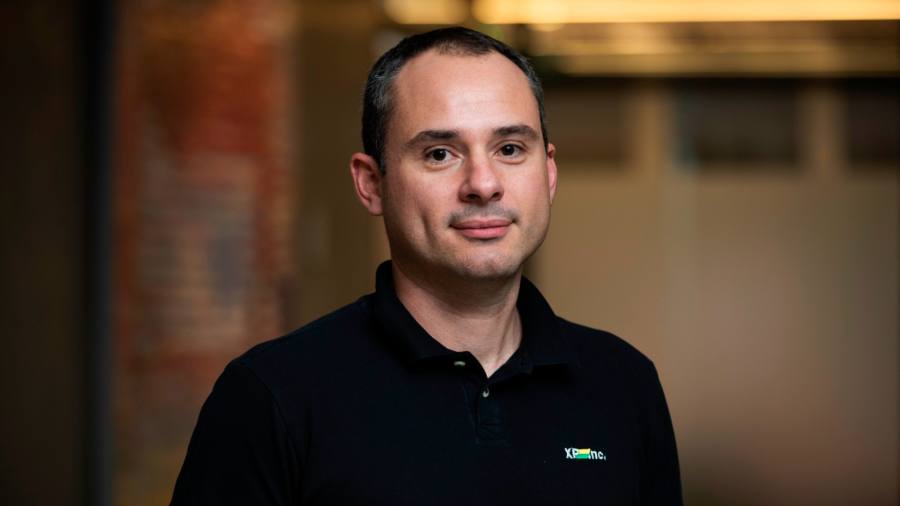Like many digital brokerages which prospered during the pandemic as locked-down savers played a booming stock market, Brazil’s XP has had a bumpy comedown.
With an array of products including a fund “supermarket” and often lower fees than the country’s handful of big banks, the São Paulo-based company has helped bring investing to a wider public since its founding more than two decades ago. In the process, it has been hailed by analysts and consumers as a financial technology pioneer.
But following the end of a bull market run, the group, which draws comparisons to US retail broker Robinhood, has seen its market capitalisation pummelled.
Listed on New York’s Nasdaq exchange, the company has lost more than half its value — some $15bn — since the shares touched a peak of about $50 in 2021.
High interest rates and economic uncertainty have dragged down the balance of money entering XP (pronounced “shees-peh”), which is also in asset management and investment banking.
Profits, which roughly doubled each year between 2018 and 2021, were flat at R$3.58bn ($737mn) last year. As Brazil’s central bank raised its benchmark lending rate from an all-time low of 2 per cent in March 2021 to today’s 13.75 per cent, investors have pulled money from shares and other riskier categories, preferring safer fixed-income investments.
Yet the company’s chief executive said a corner was now being turned, due to a combination of an improving economic outlook and the company’s own actions. A period of cost-cutting is almost complete after close to 800 redundancies — roughly one in 10 of the in-house workforce — were made this year.
“We start to see a lot of leading indicators that show, in my opinion, that the worst is behind,” Thiago Maffra told the Financial Times at XP’s headquarters.
He pointed to a fall in the interest rate curve and credit spreads as evidence. “Risk aversion will go down and we will start to see people really investing, buying a diversified portfolio. That is when we start to grow at normal levels again,” said the 38 year-old former hedge fund trader who took the top job two years ago.
Investor optimism is rising as economists in the South American nation forecast rate cuts in the coming months and upgrade growth forecasts. The local Bovespa equity index has rallied in recent weeks. Although it remains below the initial public offering price of late 2019, XP’s stock has surged by more than two-thirds so far in 2023.
In terms of winning new customers, there is plenty of room for the $13.2bn-valued company to go. XP’s platform still only commands 11 per cent of the retail investment market by assets under custody in Latin America’s largest economy, which remains dominated by the country’s top high-street banks.
In a statement of intent, Maffra said the company aimed to roughly double its share to reach the level of Itaú Unibanco, the region’s largest banking and financial conglomerate, which he estimated was at about 20 to 25 per cent. Itaú is also a large XP shareholder with an 8.6 per cent stake.
In parallel to its core activity, the company has diversified into areas such as credit cards, insurance and pensions.
José Berenguer, an industry veteran who heads XP’s bank, said this would reduce exposure to volatility. “We are an investment house. But selling other products to our client base minimises the impact of a slowdown in the market,” he added.
For now though, the new business lines only represent about a tenth of overall revenues.
“It’s working but not at the pace everyone thought two or three years ago,” Thiago Batista, analyst at UBS BB, said about the push. “In credit cards, they are expanding very fast. But this probably won’t move the needle.”
Founded in 2001 by then-24-year-old Guilherme Benchimol, who remains as chair and a major shareholder, XP began providing classes about investing in stocks and bonds to ordinary Brazilians and selling them brokerage services.
Its “financial supermarket” was modelled on American discount broker Charles Schwab. Today, XP is a full-service group with 4mn active clients, and last month, assets under custody surpassed R$1tn.
“The company has been on top of reorganising its expenses,” said Alexandre Albuquerque, an analyst at Moody’s. “They’ve been fast to adapt to the new environment. Its long-term prospects are good.”
Even so, XP’s net inflows in the first quarter slumped 65 per cent year on year to R$16bn, the lowest level since the start of the coronavirus crisis. Net income shrank 7 per cent to R$796mn.
On top of the downturn, competition has heated up. Brazil’s traditional lenders, which in the past sold typically only their own investment funds, have launched mobile apps and opened their platforms to third-party products.
Fintechs such as digital lender Nubank, as well as the investment bank BTG Pactual, have also crept into XP’s territory.
Some analysts question the group’s ability to continue effectively expanding its 13,000-strong network of financial advisers, who are engaged on a freelance basis and considered one of its selling points to customers.
The issue gained attention following the leak of a message sent by Benchimol to advisers, criticising performance and urging a “back to basics’” approach. Maffra downplayed the significance and insisted there was scope to keep increasing their numbers.
“We are in very good shape for the next years,” he said. “We are still a high-growth company.”
Additional reporting by Beatriz Langella
Read the full article here




